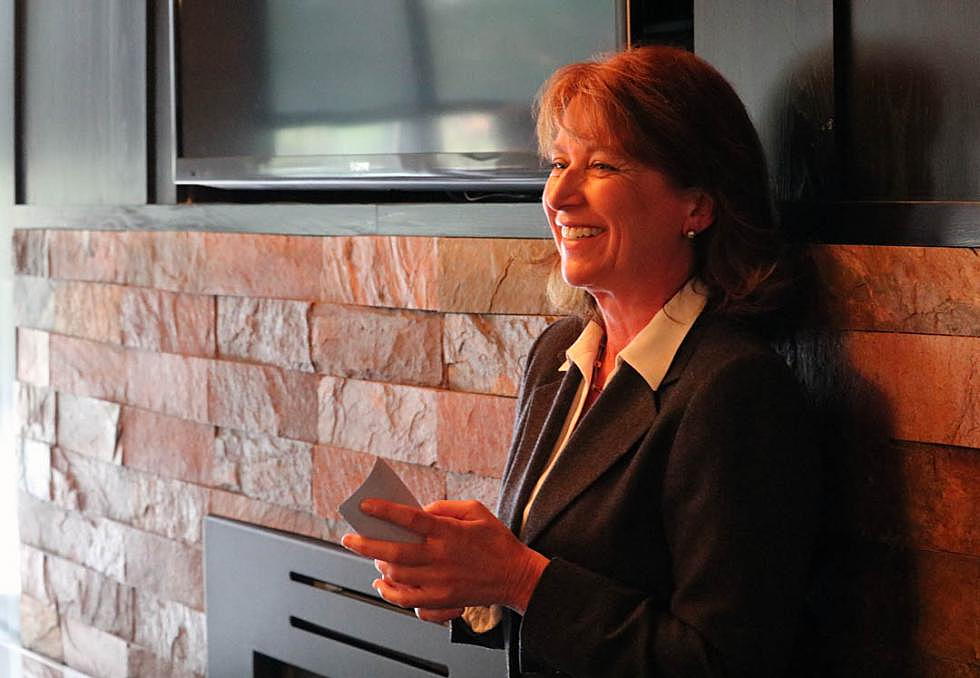
Race for mayor: Triepke pledges lower taxes, focus on basic services
When Lisa Triepke gathered with supporters in early May to announce her candidacy for mayor, she said Missoula's taxes were too high, too many decisions were made among too few people, and the city's administration lacked transparency.
Triepke, a single mother of four who works at Cost Care, has maintained those positions throughout her campaign, saying she would also reinvest in basic city services, from plowing snow to patching potholes.
And while her campaign chest is significantly smaller than that of incumbent Mayor John Engen, she believes she has the ears of voters who, like her, feel Missoula is becoming too expensive.
“After talking to multiple people in the community and business, I felt someone needed to stand up and make a difference,” Triepke said. “That's ultimately what led to me jumping into the race.”
Over the past few months, Triepke has made taxes the central theme of her campaign. The current administration, coupled with the City Council, has done little to hold the line on taxes but rather, she believes, has raised them nearly every year Engen has been in office.
That affects elderly residents on fixed incomes, students burdened by college loans and renters who've seen the cost of housing increase as landlords boost rent to cover rising property taxes, she said.
“It goes on and on, and everyone is being affected and priced out of Missoula,” she said. “It wasn't like that when I moved here and it just seems like Missoula is a place where we love to live but a lot of us can't afford to.”
Triepke moved to Missoula in 1991 and was initially one of two candidates vying to challenge Engen this November. But fellow challenger Madison Schroeder withdrew from the race last month, handing Triepke the sole opportunity to promote a conservative platform based on fiscal responsibility, term limits and municipal transparency.
Along with taxes, Triepke believes the city is awash in wasteful spending and that too many high-dollar projects are approved by too few people. Issues like the city's successful takeover of Mountain Water Co. and the South Reserve Street Pedestrian Bridge should have been decided by voters, she said.
The latter issue appeared on one of her campaign fliers as an example of wasteful spending.
“If voters are asked about making a choice and voting on something, there's nothing we can really do to argue that point,” she said. “But I think a lot of the projects going on in Missoula don't have voter input. We should be asking people. If people say no and are against a project, it gives us different ways to think outside the box.”
The city's foray into the private sector has also led to increased costs, Triepke said, suggesting they're hidden in the need for more equipment, more payroll and other expenses. That alone represents an opportunity to save money, she believes.
As for the annual budget, Triepke said that process would also change if she were elected mayor. She would prefer to look at three scenarios that include filling department needs, keeping the budget as is, and exploring a tax decrease of 5 to 7 percent.
“I think we can do that without eliminating services or people, we could just eliminate waste and overlapping projects,” she said. “But every year they come in with an increase. From talking with some people on City Council, they've never been asked to come with a decrease.”
Over the past few years, the city has enjoyed new investment in development and landed new businesses. That boosted taxable values across the city this year and is expected to continue at least into next fiscal year.
The city's unemployment rate also remains below the state and national average at 3.1 percent, increasing competition among businesses needing to fill vacant positions.
But Triepke believes the city could be friendlier to both businesses and developers and work harder to attract new companies.
“We are not super business friendly,” she said. “There's obstacles in place that prevent some high-caliber businesses from coming in and providing high-paying jobs. I think we need to find solutions with higher wages along with having housing that's affordable for these companies to come in.
“A lot of companies get all the way to the point of coming here and then can't because the housing isn't affordable. We need to be more business friendly.”
While Triepke supports the mission of the Missoula Economic Partnership, she questions its success at times. Bozeman has been successful in attracting new businesses, she said, but Missoula can't say the same.
“For some reason, businesses are passing by us and going to Bozeman,” she said. “We have to be able to find ways to attract and retain these business. The economic partnership has set some lofty goals and the city contributes to their existence. I don't know if the return on investment is there every year. They have goals they try to set out and I'd love to see that succeed.”
Triepke said she's also against any future lane reductions in downtown Missoula. The issue has been discussed in transportation circles and among the City Council, which is funding at least one study to consider transportation options along Higgins Avenue.
Reductions on Higgins, Fifth and Six streets and Orange Street have appeared either in city discussions or city memos over the past year.
“To me, we have people who go downtown and love downtown,” she said. “We have people all over the city that don't necessarily have the biking access. I think we need to be friendly to all Missoulians, not just a segment. To have a plan that creates traffic havoc when we already have so much congestion in the city doesn't make a lot of sense.”
